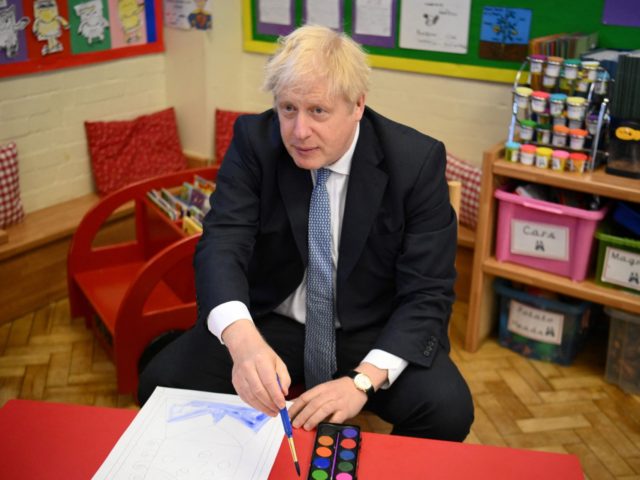Boris Johnson has once again vowed that he might do something about the European Union exerting damaging control over Northern Ireland by changing his Brexit deal, after over a year of doing nothing.
Despite supposedly being an integral part of the United Kingdom and Northern Ireland, Northern Ireland was left under partial EU control for the purposes of customs and regulations by Johnson in exchange for a trade deal in which the British government gave way to Brussels on paying a multi-billion pound “divorce” settlement, free trade in goods but not services, letting European trawlers continue to plunder Britsh waters, and Gibraltar.
Most controversially, the Northern Ireland Protocol has resulted in the creation of an Irish Sea border between Great Britain and Northern Ireland — two halves of one country — in order to preserve the supposedly all-important open border between Northern Ireland and European Union member-state the Republic of Ireland, which the EU argues is absolutely vital to maintaining peace on the island and the integrity of its so-called Single Market.
This is despite the fact that, prior to the end of the Cold War, the West German government imposed no tariffs on East Germany — a hostile communist state — and Brussels allowed it.
British unionists in Northern Ireland have become so frustrated with the government in London’s refusal to do anything about the issues that have arisen — the EU is accused of carrying out a grossly disproportionate share of all customs checks in the Irish Sea to disrupt intra-UK trade as punishment for Brexit — that they are now refusing to allow a new devolved government to be formed in Belfast following regional elections.
Prime Minister Johnson, currently in Northern Ireland, has therefore penned an article in the Belfast Telegraph urging Northern Ireland’s unionist parties to come together with Irish nationalist parties as required under the Province’s power-sharing political settlement so a new executive formed. In it, the PM has tried to claim, once again, that he might just be on the cusp of actually doing something about the Northern Ireland Protocol.
“One part of the political community in Northern Ireland feels like its aspirations and identity are threatened by the working of the Protocol,” Johnson conceded, referring to the fact that British unionists in the Province believe their new status as a “semi-colony” of the EU, as Johnson once put it, has undermined their place in the United Kingdom.
“We cannot allow the impression that… EU custom codes — designed for vast container ships coming from Shanghai to Rotterdam, not supermarket lorries from Liverpool to Belfast — somehow trump everything else,” he said, recalling that “all parties to the Protocol made a commitment to be willing to revisit, adapt and change these arrangements over time — and to protect the internal market of the UK,” although the latter is evidently not happening.
“Every unionist representative campaigned against the Protocol, as currently constituted,” Johnson noted — neatly glossing over the fact that he imposed it on them regardless in 2019, despite having vigorously opposed a Brexit deal on the sort of terms it entails at a Democratic Unionist Party (DUP) conference in late 2018, while he was still a rival for the premiership then held by predecessor Theresa May.
He added that if the EU’s position on the Protocol — it has no interested in changing it, as it serves their interests — there “will be a necessity to act.”
The Prime Minister said that “a more detailed assessment and next steps” would be set out in Parliament “in the coming days” following consultation with Northern Ireland’s political leaders — although his government has made claims that unilateral action on the Protocol may be imminent and then failed to follow through repeatedly, most recently in March.
Socially conservative, Christian conservatives in the DUP, the leading British unionist party in Northern Ireland, may be less likely to be persuaded that Johnson has their backs due to some positions set out on in his article not related to Brexit which they are unlikely to be happy about.
One is his vow that his party will “intervene to ensure that women and girls have access to abortion services in Northern Ireland that are their legal right, following the failure of the [Northern Irish] Executive to deliver this,” despite the fact this would normally be treated as a devolved issue and there is no consensus in favour of it, given the DUP’s strong opposition.
Another is his assertion that there will be “no blanket amnesty” for people accused of crimes during the Troubles, in which the Provisional Irish Republican Army (IRA) waged a terror campaign against the Armed Forces, police officers, and ordinary citizens, and Irish nationalists were occasionally subject to reprisals or the disproportionate use of force.
Unionists and military campaigners have long complained that prosecutions of often very elderly men accused of crimes during this period are invariably veterans, not nationalist terrorists — in large part because, despite Johnson’s claims of “no blanket amnesty”, almost 200 terrorist fugitives were given so-called “comfort letters” during Tony Blair’s premiership telling them they were no longer wanted, and judges later ruled this meant they could not be prosecuted.
Johnny Mercer MP, Britain’s inaugural Veterans Minister — and a veteran of Afghanistan himself — was unceremoniously sacked from Johnson’s government after he gave notice he was going to resign for the repeated failure to stand up for those who served in Northern Ireland, causing him to denounce the Downing Street office as a “cesspit” of “snakes” and “cowards”.

COMMENTS
Please let us know if you're having issues with commenting.